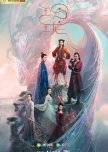
Man made goddess.
This fantasy drama is set in Sichuan, a world that is being torn apart by internal strife, corruption and disillusionment after the people are abandoned by their goddess. The young ruler Yuan Yi sets out to restore faith, peace and prosperity to his land by seeking the return of the goddess. This brings him to a remote village that is occupied by a tribe whose sacred duty is to contain the deadly earth fires from erupting and engulfing their world. There he encounters Linglong, a young girl with inexplicable powers and her father Huotu Xin. They are semi-outcasts in the village as Linglong's mother was an outsider who disappears as mysteriously as she appeared. Is Linglong the key to bringing back the goddess to Sichuan?I have to give top marks for how mythically gorgeous this fantasy world looks - especially the fabulous flying fish ships. This drama's premise around this magical fantasy land and its man made goddess is very interesting and I really enjoy how the world building takes place slowly as the mysteries of the past and the origins of the goddess are revealed. The problem is that the plot peaks at that point, meanders around before limping to an unimpressive and dissatisfying ending.
I really enjoyed Yuan Hong's performance as Linglong's father in this drama and find it to be the drama's most memorable and enjoyable relationship. His heart warming, comical rapport with Zhao Jinmai's Linglong regularly had me grinning away and made me continue even after the plot lost momentum. This is one of the best portrayed father-daughter relationships I have seen in c-drama. I am so glad I watched this because I really needed to wipe the (not good) images I had of Yuan Hong after Rebel Princess. He is an incredible and smoking hot actor and I wish the drama was written around his character Huotu Xin, who is much more interesting than the titular character Linglong. That is one of my main gripes - the titular character Linglong is not that interesting and her relationship with Yuan Yi is sweet but does not make a lasting impression. Sadly the China market is idol-focused and there is limited room for actors like Yuan Hong who are ageing out of lead roles.
I love realistically written, opaque and intriguing characters with conflicting agendas, which is how many of the other main characters are written. That makes them so much more interesting than the OTP that I care a lot more about them and am dismayed at how callously they are dealt with. Even Li Sha and Yin Xiao are much more interesting both in terms of their personalities and abilities than the OTP. Not only was I rooting for both Wu Yuan and Yin Zhuang at the same time, I was also rooting for Wei Shengyan and Huotu Xin at the same time! It is incredible that this drama manages to resolve such win-win triangles in a way that manages to disappoint someone who is rooting for both angles. Wei Shengyan is a smart and curiously likeable protagonist who suddenly does stupid, self destructive things to force the plot towards the ending the writers wanted. I don't want to spoil the end so I will just leave it at lots of stuff happens, there are many sacrifices but Sichuan is not necessarily a better place and I don't care that much about the winners.
I enjoyed many aspects of this fantasy drama and can recommend it as a decent filler drama to watch with low expectations. I rate it 7.0.
Was this review helpful to you?
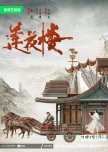
Ask me no questions, and I'll tell you no lies.
Mysterious Lotus Casebook is a dark 江湖/jiānghú story about the ultimately futile aspirations and obsessions of the martial world. In an epic battle for supremacy, Di Feisheng of the dark Jinyuan Alliance challenges Li Xiangyi, the leader of the righteous Sigu sect. Both men disappear from the martial world afterwards, leaving a vacuum at the top and their sects in disarray.Ten years later, aspiring young detective Fang Duobing comes across Li Lianhua, a famous itinerant doctor whom he is convinced is a quack. Determined to expose him, he attaches himself to Li Lianhua as inextricably as a wad of chewing gum in his hair. They run into Di Feisheng, who immediately recognises in him his old nemesis Li Xiangyi. The two old rivals remorselessly keep Fang Duobing in the dark as they try to figure out who sabotaged their fight and search for Li Xiangyi's deceased sect brother Shan Gudao's corpse. An unlikely friendship develops as they work together to solve a series of strangely connected jiānghú cases.
Plot wise, this drama is solid but dry and unremarkable. The cases all unfold at a fast pace and are easy to follow, but do not engage audience participation. They are simply plants for clues to a treasure hunt for artefacts that unlock the main conspiracy. Despite a hint of the supernatural, the cases fall short of chilling or suspenseful. The hidden mastermind behind the main conspiracy is pretty obvious and revealed fairly early on, and even the ironic twist at the end is not much of a surprise. Both villains are one-dimensional jiānghú archetypes driven by vanity and delusions of grandeur. Wang Herun's scarily convincing portrayal of the Saintess of the insane cackle elevated the role beyond its one-dimensional character blueprint.
\What makes this drama a success are fascinating main character designs, strong rapport among the three leads, the scintillating dialogues, and well-choreographed and exciting action sequences. The real mystery is about who Li Xiangyi was and why he was killed. The answers are at surface trivial. Li Xiangyi was perched at the top of the martial arts world as the world's best swordsman and leader of the righteous sects. This made him the envy and natural target of virtually everyone. However, Li Xiangyi was far from the perfect hero of Fang Doubing's idealistic imagination. In fact, he was a self-absorbed, pompous ass who believed the universe revolved around him and his worldview. His swordsmanship is matched by a brilliant, cynical mind and a razor-sharp tongue that, according to poor Ai'man, can slay a person with a few words. If there is one thing lacking in Cheng Yi's otherwise stellar performance, it is that his Xiangyi is too empathetic. This masks his many flaws and hides how insufferable and difficult he was as a person. It took me awhile to realise that his sect had some inkling who Li Lianhua really was but they refused to recognise him because they just did not want Li Xiangyi to come back.
As for Li Lianhua, he is just a shard, a detached, sickly, disillusioned and world-weary remnant of the glorious Li Xiangyi. Cheng Yi really compels with his heart rending expression of this facet of the character singing his swan song without a shred of self pity. I lived for the sudden bursts of energy or sheer willpower that momentarily revives the breathtaking, dazzling and dizzying swordsmanship that propelled Li Xiangyi to dominate wuling. Only to all too rapidly diminish back into Li Lianhua again, a wickedly unapolagetic compulsive liar whose mantra is clearly, "Ask me no questions, and I'll tell you no lies." This is how he keeps everyone, and especially the hapless Fang Doubing, at arm's length; to avoid new personal entanglements. Fang Doubing (which literally means "sickly") is a parody character, the typical naive, high-minded, young adventurer raring to make a difference in the martial world. The dialogue is well written and humorously illustrates how grudgingly Li Lianhua is moved by this pesty young detective and tacitly accepts him as his successor. However, this kind of clichéd relationship dynamic of the clueless sidekick that elevates the brilliant sleuth is too common and quickly becomes boring. Li Lianhua's lies to Fang Doubing went on for too long to the point it became cruel and unnecessary. Their relationship is over explored and shortchanges the more interesting relationship in the drama.
What disappoints me most is that the writers opted to very cursorily explore the more complex and interesting relationship between Di Feisheng and Li Lianhua. Di Feisheng is the most layered villain in this story; that rare antagonist who transforms into a protagonist. Like Li Xiangyi, he rises to the top of his sect through sheer martial prowess rather than by winning hearts and minds. They are enemies who become friends, both betrayed and searching for answers. But his story is sidelined for much of the drama, his backstory is rushed, and his relationship with Li Lianhua does not really get a chance to develop and grow. Yet the best moments of this drama, are when all three of them are together, like a found family.
I like that this ends with an action-packed finale and satisfying final confrontations with the antagonists. But as for the plot, the best reveal is when Fang Doubing figures out who Li Lianhua is, which isn't really a revelation to the viewer. And I can't really pinpoint when the plot reaches its climax, as none of the high points make a strong impression. As for the ending, it is fitting but not as definitive as I would have liked. Most of Li Lianhua's journey is about putting his affairs in order and offering closure to those he cared for; to help them move on from Li Xiangyi who in all the ways that mattered died ten years ago. Yet Li Lianhua continues to string poor Fang Doubing (and us) along, which is too cruel and inconsistent with the drama's core message about letting go of past attachments and moving on. These kinds of endings that try to please all audiences really annoy me. I still enjoyed this superbly well written drama, immensely even though I think it had the potential to be much better. For me, this is an excellent 8.5/10.0 and a highly recommended watch.
Was this review helpful to you?
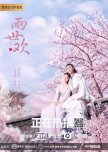
This review may contain spoilers
I will remember you, will you remember me?
This is a heart warming, unabashedly tropey love story about how true love conquers all. The OTP face a daunting obstacle: Feng Mianwan's (Chen Yuqi) mother is blamed for Jing Ci's (Yu Menglong) mother's demise. Nonetheless Jing Ci shields her from his revenge driven aunt and raises her as his companion/maid. They are childhood sweethearts but when he can no longer protect her, he finds a doppelganger, arranges for them to swap identities and doses her with an amnesia drug to forget him and their past. In her new identity Mianwan/Ah Yuan evades her (doppleganger's) engagement to the noble Mu Beiyan, dresses as a man and goes to work as a fledgling constable. In her new life, she grows into her own person and finds meaning in her existence. Her guardian angel Jing Ci joins her in a new identity as a county official and together they investigate criminal cases. They eventually stumble upon a larger conspiracy with ties to both their identities and extends to the highest levels of the empire.While this is mostly a lighthearted and fun love story, there is a sad undertone as Jing Ci's health is failing and he struggles to conceal his feelings for Ah Yuan. She does not remember him but falls in love with him all over again. His intention is to selflessly see her happily settled with someone who can expect to live a normal lifespan and who can protect her but who is he kidding? Love is never ultimately that self-less! Both characters are strong and intelligent and have an enjoyable rapport with the other couples; confidantes and allies who help them unmask their enemies and reveal the secrets of their past. I particularly liked the princess who is a fantastic and loyal friend with her own rather charming love story.
There is broad consensus that Yu Menglong's Jing Ci deserves an award for best characterization ever of a plank. Although the character is supposed to be unwell, in pain and stoic, he impressively took being plank-like to a whole new level. He has this amazingly eerie ability to seem deathly still and expressionless while speaking or in motion. Given the excoriating feedback, I feel a bit bad for the actor who clearly over-intrepretred the character and was also probably camera shy the way his eyes avoided the lens the whole time. To be fair, there were the rare one or two scenes when Jing Ci's feelings for Ah Yuan overcame him that were well acted though far from squeal-worthy. The one saving grace is he and Chen Yuqi make for a very stunning and romantic looking couple. Am a big fan of Yuqi who has really honed her acting skills and was convincing as a smart and independent minded character who knows what she wants and is not fooled or daunted by Jing Ci's seeming indifference. I really appreciate this smart and strong female lead character who is not obnoxious or dislike-able, which is more than I can say for several similarly themed 2020 releases. She is a total delight from her remarkable ability to absolutely adore her plank to her subtly comical eye rolls at Mu Beiyan's ridiculous overtures. And no, I never shipped her with Mu Beiyan - her Ah Yuan is way too capable for a dilettante and (nice) dufus like that. While Mu Beiyan is a well written, likable and much better acted character, I still find it impossible to ship a love rival who is better made up and coiffed than the female lead!
The story overall is not terribly original but the cases are interesting enough. You will not win armchair detective of the year if you spot the bad guys early on or unravel the conspiracy on your own. Some of the plot twists are a bit lazy but the characters are quite colorful and stop short of being too archetypal. The ending was well done, wraps up most loose ends and delivers a final and very satisfying coup de grace. It won't rock your world but you won't have to retreat into the fetal position to get over a gigantic slump after it ends either. I would have rated this higher (7.5/8.0 ) if Yu Menglong's performance managed to improve towards the end.
Was this review helpful to you?

Genius is 1 percent inspiration and 99 percent perspiration.
At twenty-three, Lin Zhaoxi lives a life of quiet desperation. She grows up in the shadow of two natural math geniuses - her father Lin Zhaosheng and his mentee and love of her life, Pei Zhi. Despite her passion, her aptitude for math is not intuitive and falls short of true genius. Discouraged, she majors in philosophy and is resigned to a mundane existence. She also loses touch with Pei Zhi after he leaves to further his studies in Germany. Her world unravels further when she discovers her father Old Lin has early onset Alzheimer's. Then out of the blue, she is whisked away to cheese world, a parallel world with a childhood classmate Ji Jiang. In order to return to their world or strawberry world, they must win Math Olympics. This was a challenge she failed as a child. It was arguably the great inflection point that put her on a less satisfactory life path, one that is lacking passion.Don't be put off by the math aspects of this drama; the writer does a good job making abstruse concepts and theorems quite approachable and avoids getting bogged down into the weeds. The storytelling indulges in almost ten episodes of sheer childhood delight as the young Lin Zhaoxi, Ji Jiang and Pei Zhi try out for Math Olympics. The child actors led by Wang Shengdi, Fu Bohan and Lin Zeyi blew me away with their natural and uninhibited articulation of joie de vivre that conquers all. The young cast steals the show with their empowering message that genius is 1 percent inspiration and 99 percent perspiration. The Harry Potter allusions were brilliant - it just cracked me up that no one wanted to be Harry! It also pays proper homage to Snape, one of the most complex, fascinating and moving fictional characters ever written. This is indisputably the strongest, best arc of the drama.
The middling arc is a struggle by comparison as both Zhang Xincheng and Zhang Zifeng take time to get in character and are not that convincing as lovers. It is not a bad arc at all, in fact the father daughter dynamics are very enjoyable and touching. It is just that the first arc is just too good. Initially, Zhang Zifeng seems mis-cast because unlike Ji Jiang and Pei Zhi, I could barely see any vestiges of the child that was Lin Zhaoxi. But upon reflection, it is intended that all of that youthful optimism and sense of invincibility is extinguished. The actress really redeems herself in the latter episodes, especially in her chilling encounter with her doppelganger. Oddly it is Zhang Xincheng's performance that doesn't hit all the right notes in this. I think he is much less comfortable taking on grey or flawed roles. I didn't like Pei Zhi for most of the drama and only empathised with him after his heart to heart with his father Pei Donglai in cheese world. Both the young and grown Ji Jiang is far more charismatic and is seamless portrayed by both actors. As always the veteran actors Lei Jiayin, Wang Xiao (Zhang Shuping) and Geng Le (Pei Donglai) are the ones that save the day by extracting the best performances from the younger actors. In this one, even they are outclassed by the amazing kids. Ni Ni's brief stint as an omnipresent and unforgettable character is both delightful and heartbreaking. The drama picks up pace and comes together in the final act. It finishes strongly with a few good mind blowing twists and reveals to end in a good way. Some may not like how it was all wrapped up but I did and I explain why in a spoiler in the comment section of this review.
The Heart of Genius is a well-crafted and intriguing story about life, love and friendship that is comical, inspiring and heartbreaking. Everyone makes mistakes and has regrets; Lin Zhaoxi didn't try hard enough, Pei Zhi lost his father too soon; Lin Zhaosheng didn't fight to clear his name; Zhang Shuping did the wrong thing... This drama tantalises with the impossible fantasy of re-writing history, to have a chance at a do-over of the big what-if moments in life. It proves that even though assholes are still assholes in each world, the grass is not necessarily greener in cheese world; that there are always consequences and trade-offs that are of unknown, unknowable value. Thus we must be consoled by the wisdom that life is not a fairy tale and who we are and who we love are the sum total of our shared experiences good and bad. To live in the moment and to accept what we can't change. It is a very engaging and thought provoking drama that does not seem to get the appreciation it deserves. It is one of the most enjoyable dramas I watched recently and am happy to rate this an 8.5 overall.
Was this review helpful to you?

Can't judge a book by its cover.
Judge Dee is one of the most widely adapted and iconic ancient Chinese detective figures in popular culture. Di Renjie, or Judge Dee was a prominent Tang Dynasty official and twice chancellor to Empress Wu Tzetian. In the 19th century, Dutch sinologist and diplomat Robert Van Gulik translated an 18th century novel by an anonymous author Dí Gōng Àn/狄公案/Celebrated Cases of Judge Dee, into English. He went on to write numerous other Judge Dee mysteries, increasingly crafting Judge Dee in his own image. Van Gulik's books are regarded as a cultural bridge between East and West. They were devoured by the Chinese diaspora long before Tsui Hark fanned the flames with his wildly popular Detective Dee movies.Judge Dee's Mystery/大唐狄公案 loosely adapts nine cases from Van Gulik's novels for the small screen. This drama has notably high production values with lavish sets and costumes designed to create an immersive visual experience. The cases are well crafted with meticulous attention to detail and pay homage to Judge Dee's reputation as a people's hero; a champion of truth and justice for the common people. The cases highlight the discontent at some of Empress Wu's policies and shortcomings of the Tang Code, China's earliest legal code. Di Renjie gained many insights on the struggles and aspirations of the common citizens as magistrate of many important provinces across the empire. This shaped him into a great statesman and reformer in his later years; a chancellor often known to stand up to the formidable Empress.
This is the kind of drama that I should love - its my favorite genre featuring my favorite Chinese detective, set in my favorite Chinese dynasty and is helmed by a few of my favorite actors. The fight scenes are fantastic and the whole thing just looks gorgeous and bloody expensive. Which just goes to show you, you just can't judge a book by its cover. Because even though there are some really great moments, overall this drama just bored me silly.
The problem with the cases is that the four episode are too long when the villain is usually obvious from the beginning. There is not enough development of the suspects or the victims to make the audience care about the why-did-it. The audience also does not get to participate in the solution. Instead, the intricacies of the how-did-its are revealed as flashbacks in Judge Dee's mind's eye. The cases do get better in the latter half as they tie into Judge Dee's past and are shored up by the appearance of characters like Diao Xiaoguan (Zhang Ruoyun) and Lin Fan (Jiang Yi). Even then, the writing tends to tie the minute details together well while leaving big gaps on important things. Thus it is never fully explained what Diao Xiaoguan's motives were or what terrible thing the young scion of a noble household did that got him disowned and left to fend for himself.
The biggest issue with this drama is that Zhou Yiwei pretty much carries the entire crime-solving team by himself. None of the supporting characters are well designed and there is zero chemistry between Ma Rong, Qiao Tai and Judge Dee. This is made even more obvious when Deng Xiaoguan shows up and there is a tangible difference in the dynamics between everyone. Both of Dee's sidekicks appear and disappear inexplicably in the middle of a case as and when the plot requires. Ma Rong is written to be a comically obnoxious character but there is nothing funny about her obnoxiousness. This is the obvious the weak link in the cast and one that is utterly lacking in charisma that unfortunately gets too much airtime. Inasmuch as Zhou Yiwei and Wang Likun deliver a heart-stopping and mature portrayal of attraction and love at first sight, sadly Cao An is written to be a blank character; an elegant musician well past her youth clinging to a silly girlish fantasy over a highwayman (face palm). She only serves decorative purposes until the final case, where she finally gets to shine with her bravery and her foolishness.
In conclusion, this is a visually stunning production that stays true to its source material in terms of setting and thematic elements. However, despite some exciting and well choreographed action scenes, it fails to deliver truly captivating mysteries and is bogged down by lackluster supporting performances. While the cases in Strange Tales of Tang Dynasty (2022) are only a tad more tightly written, the humor and fantastic crime solving team dynamic elevates that series over this one. That said, Judge Dee's Mystery is not a terrible way to pass some time even though it ultimately falls short of making a lasting impression. I rate this Seasons 1 a 7.5/10.0. Season 2 has been filmed and should air by early 2025.
Was this review helpful to you?

Who is the big bad wolf?
This is a passionate fantasy fairytale that unflinchingly explores the thin line between love and hate and many emotions in between with a dark intensity that will not appeal to everyone. Hidden within this dark, at times ugly complexity is a simple, intense mythical love story that is beautiful in its fleetingness.Once upon a time, Xing'er, the lonely young daughter of a feudal lord befriends Langzai, a wild orphan boy raised in the forest by wolves. Even before they understand what it means, they fall in love and form an unbreakable bond. But after a terrible misunderstanding, Langzai is whisked away by the tyrannical, paranoid and evil emperor Chu Kui who weaponizes him. When they meet again, Langzai is the fearsome Prince Bo, a ruthless, lethal military leader who keeps the mad, bad despot's internal and external foes in check. And Xing'er has grown up to be the beautiful Princess Ma Zaixing, a pawn whose family's military might is coveted by both Chu Kui and the rival Jin king. A damning accusation, divided loyalties and duty forces them to be mortal enemies and opposing forces push them towards what appears to be mutually assured destruction. Can true love uncover the truth that can defeat the darkness in their souls and free their land from evil?
This drama is not plot driven; the story is easy to follow with a few well conceived mysteries to be revealed but the villains are known from the outset and there are no shocking twists. It is very well paced and the action and battle scenes are ferocious, brutal and gripping. Rather it is largely a character driven drama where the main protagonists fight for who they choose to be and who they want the love of their life to be. It asks the question - who is the big bad wolf or who are the monsters? Is it the wolf in wolf's clothing or the wolf in sheep's clothing?
This character drama is made especially memorable by the many well cast and compellingly delivered roles. They are difficult roles to convey because all of the main characters are flawed and they all have inner animal avatars. When they are tempted or threatened their most primitive instincts emerge and we see both their best and worst selves. To properly appreciate this drama, it is important to keep this in context because the writing does not try to sugarcoat or suppress these traits, instead it gives them free rein to build into raw moments of enraged conflict, unimaginable pain, dark passion, misguided loyalty, pure love and violent hatred. All of the characters make mistakes both selfish and well-intentioned mistakes with heartbreaking and irreversible consequences.
The styling and costumes of the characters are designed to accentuate their inner animals and each of them are written to highlight their inner animal's associated personalities and strengths and weaknesses. We know that Langzai/Bo Wang (Prince Bo), the titular character is a wolf. Xing'er/Ma Zaixing is a butterfly, the least complex, most single minded character of them all. Ji Chong is an eagle and Bao Na is a horse. Yao Ji, the most underrated character in this drama is an enigmatic, treacherous and wise snake (I think). Her relationship with Bo Wang is the most surprising, complex and interesting relationship in the drama, much more so than both Bo Wang and Ji Chong's relationship with Xing'er. I wonder how many supernatural abilities these characters were originally endowed with before the censors erased all of that stuff.
The following is a deeper discussion of the main characters and their relationships that inevitably contains mild spoilers. You can stop reading here and come back to the rest after you are done with the drama.
I initially mistook Xing'er for a frustrating character - weak, naive, unwilling to grow up and one dimensional. But that is her nature - she is a butterfly - a delicate, transitory being that is a symbol of youth, joy, love and beauty. Female butterflies mate only once and then they die. Her goals are simple and she is pure hearted but she is by no means weak; on the contrary she is single minded and unyielding in her love for Langzai and her determination to recall him from the darkness that is Bo Wang. Her heart is gently cruel in its lack of capacity to to let anyone else in. This kind of role is both very easy and very difficult and Li Qin pulled it off phenomenally (despite a shrill and atrocious voice dubber). I could feel her pain and disillusionment and teared up as I watched Xing'er innocence and love of life get extinguished into the strong, mature, revenge driven but indifferent Ma Zhaixing.
Bo Wang is a sexy, magnificent, conflicted and tortured beast of a character that I loved to hate in the beginning and hated to love at the end. He is the big bad wolf, a ruthless predator with savage methods but he is also highly intelligent, passionate and devoted to his pack or his family. Wang Dalu's portrayal is so vivid and potent that I could see a wolf lurking behind Bo Wang's every facial expression and gesture - I can't believe I have never watched this actor before. The scorching chemistry between Bo Wang and Xing'er is the most outstanding feature of this drama. Both actors have such intense screen presence that anyone that shares the screen with them becomes invisible. Their passionate, tormented kisses and the intense longing in their gazes give lie to their often toxic verbal exchanges. Their relationship scales the tortured depths of hatred and despair to the breathtaking heights of love and ecstasy. They are so convincing and moving as a couple that all of their love rivals pale in comparison.
Ji Chong is an eagle, a bird of prey that can see the big picture from high above and swoops down opportunistically and tactically to force the lovers to face each other as mortal enemies. Like Bo Wang, Ji Chong also tries to save Xing'er by changing her; in this matter he and Bo Wang have a common agenda. While their methods are diametrically opposite, the outcome is the same in that they both cause her to suffer enormously. Bo Wang pushes her away harshly and cruelly while Ji Chong albeit charmingly, imprisons her with duty and obligation to her clan. Bo Wang loves her enough to give her up but Ji Chong more selfishly and somewhat naively tries to wheedle and manipulate his way into her heart. Ji Chong and Bo Wang are both ultimately well intentioned but make many mistakes and are thus equally responsible for all but erasing the Xing'er they love. I am very impressed that Xiao Zhan chose to play such an interesting, endearingly immature and flawed second lead rather than yet another insipid and suffocatingly noble and selfless one. Just as with his iconic interpretation of Wei Wuxian, Xiao Zhan's blinding charisma compels us to forgive Ji Chong's flaws and weaknesses and even empathize with him.
Surviving to exist is not important to Xing'er who only cares that she rescues her Langzai so that they can retreat into the forest away from the two legged monsters that walk the world outside. With this in mind, the drama's ending is not just good, it is also fitting. As someone who loves such beautifully flawed and even dark characters, I find Xing'e and Langzai's mythical love story to be unforgettable so this has to be a 9.0 possibly even a 9.5 for me. I can understand why others may find the themes too darkly disturbing and judge the characters much more harshly.
I will end with a nursery rhyme I vandalized for @sony_t:
Wheedle eagle, pudding and pie,
Kissed the butterfly and made her cry,
When the wolf came out to play,
Wheedle eagle flew away.
Was this review helpful to you?
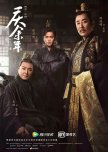
No time to die.
I have never watched a Chinese drama quite like Joy of Life. It Is pure entertainment, a heady, masculine cocktail of science fiction, political intrigue, espionage, martial arts and laugh out loud comedy. A dying young man laments his life cut short before he experiences the joy of life. He finds himself reborn an infant in another time with intact memories of the 21st century. Raised by his grandmother, this cunning, cynical know-all kid is expertly schooled in martial arts by his uncle Wushu (pun fully intended) and in medicine by a deadly poison master. Summoned to the capital by his distant father, Fan Xian sets off eagerly, anticipating the beginning of his carefree, happy existence. But his glee is short lived as someone wants to kill him dead. He finds himself saddled with a political marriage he is hell bent on squirming out of and his mother's legacy - control over immense wealth and the incredibly powerful Oversight Bureau. This is at odds with his desire to indulge in joyful pursuits and worse, catapults him right in the middle of a power struggle between two princes. Soon it appears as if everyone wants him dead. But Fan Xian literally has no time to die as he is swept away by a whirlwind of timeless secrets, murky political conspiracies, shocking betrayals and sinister encounters with opaque characters that could be friend or foe.Fan Xian is the central, core character that the plot revolves around;, there isn't really a female lead or a second lead. Fan Xian is a smart, ruthless and cunning rascal with very strong survival instincts who is not about to let anyone short change him of his second chance. His life philosophy and indifference to common inducements stymies family, friend and foe alike, leaving them at a complete loss as to how to motivate or manipulate him. Unlike his mysterious mother, a woman beyond her time, lofty aspirations like changing the world in the pursuit of social justice couldn't be further from Fan Xian's more self oriented goals. Until the world changes him when someone with joy of life shows him that there are things worth giving one's life to protect. This moves Fan Xian unaccountably, makes him do things against his nature and better judgement, it stays with him and forces him into the fray, to risk his life for what he wishes to protect. This pivotal moment and how it sparks a growing flame adds a defining dimension and substance to Fan Xian, one of the best written, most layered and entertaining characters I have come across in a long time.
This serpentine political chronicle satirizes the ruthlessness of man's ambitions and how it coincides with life's cruel and random vagaries. Most of the characters, including Fan Xian are scheming, ruthless, violent, deceitful and utilitarian. Bad things happen to good people, actions have consequences, people die, forgiveness and justice are not always possible. This underlying dark tone with its bitter notes and philosophical questions is so artfully disguised by the wit and humor that drenches this drama that it easily passes off as a comedy. The entire tone of a scene or a conversation can just shift with a bizarre interruption or a non-sequitur mundane question or digression that shouldn't even be funny but somehow is. The wit and comedy from clever word puns to baffling allusions to 21st century concepts are not merely for laughter's sake they are intended to hint at character traits, hidden motives and unspoken truths. The plot is action packed with many twists and is littered with thrilling martial arts encounters where moments of imminent peril can be unexpectedly broken by well timed comic relief.
To put it simply Zhang Ruoyun simply owns the character Fan Xian, it is unimaginable that anyone else can pull off this jaded, irreverent, manipulative and utterly irresistible rogue in such a compelling way. Even though this is not much of a romance, Fan Xian seems to have an affinity for and way with women that recalls Jin Yong's lascivious and vile Wei Xiaobao but in today's day and age, it is only acceptable that he is limited to one true love. From his hilarious sidekick the venal and wily Wang Qinian to his riotous siblings Sizhe and Rou Rou to his numerous antagonists, Fan Xian is surrounded by exceptionally well cast supporting characters that are properly fleshed out and have agency and free will. My personal favorite is of course the emperor, who is the best example how this drama dazzles with the art of the unexpected. I was completely nonplussed to see an emperor slither around in dishabille; with escaped hair tendrils and in oddly sensuous low cut nightgowns that flaunt his tanned bare chest. I was right there with Fan Xian in refusing to kowtow to such a slob and surprised he didn't have to leave a thumb or two behind as a result. Multiple clues to one of the big plot twists hide in plain site, from the oddly misplaced pieces of wardrobe and styling to the borderline goofy, eclectic 1980s subtly Latin background music. The unique and creative combination of casual (much dialed down) violence, cartoonish character traits, strange props, out of genre music, and the odd wit and humor in mundane dialogues reminds me of Tarantino, something I did not at all expect here.
This is of course just the first of three seasons. And I must admit I dropped this after 5 episodes when it was airing. I don't even remember why I didn't like it at all at the time. On my second attempt, I was addicted from the first episode and enjoyed almost every minute of it. I do think that the Bei Qi arc was not at the same level of the first arc, which set a very high bar. I was less invested in the characters in the Bei Qi arc and I found Xiao En's big reveal too long winded and his giant secret overly built up. One of the main roles in this arc is very poorly acted and noticeably several notches below the level of the rest of the veteran cast. The actor tried so obviously to be opaque and inscrutable that I pinned them as a backstabber right away. Their fixed wooden stare failed to connect with Fan Xian at any level and in several scenes I felt like Fan Xian was talking to a mannequin or to himself. This made it look like after being so smart and distrustful for so long, Fan Xian inexplicably let his guard down way too easily. Into the final moments of the last episode Fan Xian continued to be dumbed down and was pretty much thrown under the bus to force that completely unnecessary ending "shocker" that I could see coming a mile away.
The biggest drawback of this drama is of course the long wait for season 2, which still has not even started shooting as of May 2021. However, this shouldn't hold you back from watching this now due to its high rewatch value. I rate this a 9.5 for now but it has a potential to be upgraded to a 10.0 if the next two seasons deliver.
Was this review helpful to you?

Hope is not a strategy.
The Hope is the Chinese adaptation of a Japanese manga Dragon Zakura about an unconventional teacher who takes on a class of underachieving students. While I haven't watched the Japanese television version, this Chinese adaptation has clearly been heavily localized even though it retains a manga-like flavor in certain characterizations and comedic sequences. This drama critically examines the Chinese education system and its strong emphasis on the all-important Gāokǎo/高考 nationwide college entrance exam which takes 9 hours over two or three days. In a nation of largely single-child families, nothing is more important than getting their only child into the college of their dreams. With over 10mm taking the Gāokǎo each year, the competition is intense. Even though the pass rate is very high (85-90 percent), a minimum score of 600 (out of 750) is needed to gain acceptance to the most elite universities. Less than 7pct of students are accepted at these top universities and the acceptance rate at Qingbei (Tsinghua University and Peking University) where the crème de la crème matriculate is less than 0.1pct.After a series of entrepreneurial setbacks, star lecturer Lei Ming returns to teaching. He teams up with Sang Xia, a psychology teacher on an experimental program to turn around students that are not living up to their potential. His handpicks five students for his experimental Class 11; an orphan Li Ran, a math whizz Cheng Yushan, an aspiring rapper Jiang Qinglang, gossip girl Bian Xiaoxiao and the browbeaten Yu Yang. With Gāokǎo just a year away, his lofty boast of getting all five of them into Qingbei is widely ridiculed. His biggest skeptics are the students themselves and Sang Xia. His methods though unconventional are hardly trailblazing; much of it involves tried and tested methods used by successful students including time management, minimising distractions, identifying focus areas and being tactical about selecting courses. The drama makes it clear that hope is not a strategy and that while there are smarter, better ways to study, there is just no way around putting in the hours.
This is an exceptional drama that makes a poignant and compassionate case for students who have fallen behind. It exposes how they are failed by an indifferent sink or swim kind of education system. Each of the young actors does a fantastic job portraying their hardships, self-doubt and how they discover their best selves in their struggle against overwhelming odds. I don't have a favorite among them because they all have their own special talents, their own crosses to bear and blossom in their own ways as they learn to take ownership over their own destines rather than just being victims of circumstances they can only change at the margin. Lei Ming and Sang Xia are like fairy god parents who can help but can't make their lives perfect. Rather, they impart upon them the invaluable gift of learning how to cope and the ability to feel compassion for others. This is seen in how the understanding they show poor little rich boy Shen Yao and Lei Ming himself when he lets them down. In saving them, in many ways Lei Ming saves himself.
As for Zhang Ruoyun, he once again shows his uncanny ability to pick fantastic scripts. As always, he leaves so much runway for his young co-stars to shine and lets this story really be about them without defaulting into simply being a plot device. Because his Lei Ming is far from perfect; he is cynical and beneath his confident facade, deeply damaged by his resentment of his father, the great teacher Lei. In helping Class 11 in their struggles with Gāokǎo and their personal devils, he gains perspective on his own journey many years ago and gains some understanding of his father. My heart was in my throat watching Zhang Ruoyun portraying this role so movingly in light of his own difficult relationship with his father. Probably largely due to Zhang Ruoyun's powerful charisma, I found Sang Xia's constant baiting and argumentativeness to be pompous and super annoying initially. But she grew on me and I came to appreciate how their relationship actually thrives on calling each other out and challenging each other to do better.
This drama for all intents and purposes ends at episode 29 and it is fine to just stop there. The episode 30 "twelve years later" epilogue replaces the young actors with older vague lookalikes. That broke my connection with the young actors that I grew to love so much. I didn't mind the sober tone of the epilogue. It delivers the right message that there are no absolutes in life; that even Qingbei is no guarantee that all's well that ends well. The biggest lesson learned, the one that stands the test of time beyond all the academics is about coping with life's ups and downs. And they are still young enough that the whole world still lies ahead of them so their journey continues. My biggest issue with it is I had hoped for better for Lei Ming. But I guess that is what makes this drama so special; this ability of to be so incredibly inspiring yet so unbearably realistic at the same time. If you wish to skip the realism, then call it a day at episode 29. It still falls short of a fairytale but at least there is an abundance of hope.
This is a highly recommended and very memorable watch that I enthusiastically rate 8.5/10.0.
Was this review helpful to you?
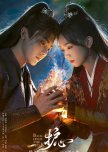
How to train your dragon koi.
This rom com xianxia is a barrel of laughs. It is about an ancient spirit dragon Tian Yao who falls for the wrong woman, a rancid Taoist harpy called Su Ying. She steals the guileless Tian Yao's heart and scales at the altar, dismembers him and stashes his core magical parts in different directions. A shadow of his former self, he encounters a dauntless, money loving, ousted Taoist disciple Yan Hui. They form an uneasy alliance that subjects the embittered Tian Yao to the indignity of becoming her demon familiar, a dragon koi. His plight wins Yan Hui's empathy and she vows to help him recover his shards. She soon discovers that learning how train your dragon koi is an arduous and dangerous task. Despite his deceptively benign appearance of an odd hybrid of koi, deer, pony and dragon, Tian Yao is a very dangerous creature. Apart from having deadly taste in women and friends, he also has a nasty habit of stabbing first and asking questions later.The interference of a mysterious shadow cupid Bai Xiaosheng comically advances their romance until the enabler turns into an obstructor. It is pretty much three's company as they go on many adventures, picking up lifelong friends along the way. Despite some run-of-the mill xianxia tropes and cardboardl villains, the friendships and adventures shine and are the high points of the drama.
Zhou Ye again proves her mettle as one of the most promising young actors out there. Her Yan Hui is spellbinding. She infuses the role with that effervescent joie de vivre and passionate idealism of youth that inevitably eludes older, perhaps lovelier and more seasoned actors. She looks shockingly good with Hou Minghao, whose acting is to say the least, a work in progress. But dang, he is so drop dead gorgeous that I barely register that he looks constipated at the most inappropriate moments. In some ways, his casting is brilliant as a rather uncomplicated and overly good character that loves and hates with equal ferocity. After all, dragons, kois, ponies, deers are all creatures with bigger hearts than brains. So he does some really (let's admit it) not smart things but he is so pure hearted it's almost impossible to fault him. Notwithstanding some acting rough spots, this splendid pairing had me rooting hard for them all the way.
As for the plot, its biggest criticism is that it strays from the original beloved novel in some unforgivable ways in terms of both Yan Hui and Tian Yao's characterisations. I didn't read the novel so I won't opine on that. What I can observe is this drama hooked me from the start despite the low budget and the somewhat cartoonish CGI with phenomenal storytelling. I loved Bai Xiaosheng and found him to be a wickedly good accretive addition to the original story. Unfortunately, about halfway through the characterisations of Bai Xiaosheng and Tian Yao take an abrupt nosedive. It is as if a different writer took over and defaulted into the worst, laziest tropes out there. Although the narrative recovers from a massive hiccup in the middle, it falls well short of the beginning momentum. The writer failed to capitalised on such a fresh and unusual character such as Bai Xiaosheng and turns him into a tired trope that gets sidelined toward the end. Nonetheless Wang Yilun is hugely entertaining in this role and though not as pretty, he is incredibly charming and out acted Hou Minghao. As for how Tian Yao's character is assassinated, I have no words and although he more or less redeems himself, I wish they had not gone there. I am told Yan Hui is also diminished in this adaptation but as far as I am concerned, she is perfect in her imperfections. She elevates Tian Yao to the extent, that I can forgive his character's stumbles in the middle.
While I enjoyed this drama from start to finish, there are too many shallow sub-plots in the latter half and the theme of love obsession is over-exploited. The ultimate antagonist had repetitive indifferently narrated motivators that while hateful enough, lacked depth and complexity. In fact, Su Ying was a more interesting villain than the final boring mastermind who is just beyond meh in terms of motivation, acting and complexity. Overall, this is a humorously told story that re-hashes well explored xianxia themes with no profound new revelations. Indeed the underlying substance, emotion and message of the original works is perceptible but is neglected and abused in the telling. I had big fun and many laughs with this drama but I can see how it missed the opportunity to be a whole lot more and can only rate it 8.0/10.0. I may have gone with an 8.5 had they rolled out Hou Minghao in that spectacular white wig earlier on in the drama.
Was this review helpful to you?
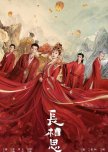
The Princess Bride.
Lost You Forever is a dark, beautiful, suspenseful and, poignant tale of intrigue, treachery and longing. This drama is immersive with its air of mystery, the shiver of danger, a whisper of regret and a sense of profound loss and longing that saturates every scene. It is a story about love but it is not a love story. It is a far more complex and expansive exposition of the many kinds of love and how it can be restraining and boundless at the same time.Set in Dahuang, a magical, treacherous and unpredictable world where humans, demons and deities co-exist, two forsaken royal orphans vow to always cherish and protect one another. Shattered by a broken promise, Xiao Yao loses herself, misplaced during a time of great turmoil. She assumes the appearance of a man and lives among the humans and demons of Qingshui Town as the village fertility doctor. This is the most exciting arc because everyone has secrets and danger lurks around every corner. When cornered, Xiao Yao is most adept at grovellng, lying or poisoning her way out of trouble. Yet she is carefree, uninhibited and almost contented in Qingshui Town with her found family. Alas, destiny catches up with her as Cang Xuan, Tushan Jing and Xiang Liu all converge upon Qingshui Town, shattering her refuge.
The latter arcs take on a political tone as Cang Xuan emerges as a contender for the Xiyan throne with Xiao Yao clearing the path for him. They must establish Cang Xuan's support base among the restless and resentful Central Plains; where the noble clans and families have complicated blood ties to remnants of the defeated Chenrong state. Xiao Yao is the princess bride, a chess piece that Cang Xuan dangles temptingly in front of the scions of the powerful aristocratic families he seeks to win over. Marriage to him is simply a means to seal alliances. He supresses his heart's deepest, secret longing by sheer willpower. Zhang Wanyi adroitly portrays Cang Xuan as a consummate politician, a very dangerous, smiling tiger / xiàomiànhǔ 笑面虎 who has his enemies in a death lock before they even know it. Love is not of paramount importance for Cang Xuan and Xiao Yao, whose destinies are interlocking as a result of their childhood oath. They work towards a greater purpose with one heart and one mind. Anyone and everyone else is always subordinated to this purpose. They are both unattainable characters who have already carved out so much of themselves for each other that there is not much left for anyone else. This is why what Xiao Yao seeks is an unequal relationship with essentially, a doormat. The princess in her however prefers that it is a doormat made of fox fur rather than a rather foolish, entitled product of too much in-breeding.
Xiao Yao is by far the darkest, most complicated, and most independent female protagonist I have come across in Chinese dramas. This is an awesome and challenging role that Yang Zi delivers magnificently. As someone who had a huge allergic reaction to her earlier works, I am speechless at her portrayal. Her Wei Xiaoliu has decisively unseated Ni Ni's Fang Weizhi as the most convincingly acted female disguised as a male character. But it is her heart-wrenching homecoming scene that can squeeze tears from a rock that truly captures the depth of Xiao Yao's sense of abandonment and despair over the person she lost forever. I can't think of another actor that has so visibly taken their acting to a high a new level the way Yang Zi has. That said, no power on this earth will make me revisit her past roles though I enthusiastically look forward to her future ones.
Tushan Jing is the weakest link in this drama both in terms of how the character is written and portrayed. Despite his stunning physical appeal, this is not a role that a promising but inexperienced actor like Deng Wei is ready for. He pulls off a charismatic and endearing Ye Shiqi that melted Wei Xiaoliu's stone-cold and lonely heart. But he lacks depth and range and visibly struggles to get into character as Tushan Jing. His perpetual stricken, deer-in-the headlight expression threw me out of some of the drama's best, most intense moments. When the Haoling King assures his daughter that the shrewd and canny Tushan Jing must have already guessed her identity, the camera pans to a dumbfounded looking Tushan Jing! I burst out laughing even though I am absolutely sure I was not supposed to. It does not help that the character's weak and indecisive waffling does not match Tushan Jing's reputation as one of the most brilliant and cunning minds of Dahuang. There is clearly also a writing issue but it does not excuse the actor's inability to make the character seem deeply conflicted rather than just weak and lacking basic smarts and survival instincts. This is a glaring weakness that weighs on both my viewing experience and my rating.
Xiang Liu is Xiao Yao's greatest nightmare, a demon that she is bonded to by a spell no one fully grasps. He is her soul mate; they are both lonely, realistic characters trapped by a cause that is bigger than themselves and thus have no free will. Tan Jianci's masterful, subtly tragic rendering of this vicious, resentful and enigmatic nine-headed demon with a shockingly passionate heart has catapulted this fantastic actor to a new level recognition. His styling is spectacular but what takes my breath away is how with the angle of the head or a flicker of an eye, his expression can change from unholy amusement to vicious cruelty; from tortured to pure, unbridled joy and affection. I don't know how Xiang Liu's story ends but the fact that he is committed to a lost cause that pits him against the person Xiao Yao protects at all costs fills me with dread. I cannot see any scenario in which this ship does not somehow sink but my heart won't listen to my head that urges me to get on the lifeboat to safety before it is too late.
Season 1 sets up the backstory of a world torn apart by war and introduces many well-written and multi-faceted characters that were collateral damage in the conflict. Intricate relationships and debts that will at some point come due accumulate between the various stakeholders. After some draggy politicking, Season 1 ends triumphantly with an unexpected twist and sets the stage very nicely for Season 2. I expect Season 2 to reveal even more secrets from the past that will force Xiao Yao to make some impossible choices. How unbreakable is her bond with Cang Xuan? Will the tragic story of Chi Chen and the Xiling witch repeat itself? Will Deng Wei finally get his act together and give us the real Tushan Jing? Will Xiao Yao shock us with her marksmanship by shooting her rival in her black heart? I hope we will not have to wait too long to find out. At the same time, I am grateful that this breaks in a good place for a time out. I have come to care too much for these characters and something tells me that this is the kind of story where even those who get what they want may not truly want what they get.
So far, Lost You Forever is the most addictive and immersive drama I have watched in 2023. I rate this a 9.0 for now because there are some notable flaws but if Season 2 comes together well, there is scope for me to revise it up.
Was this review helpful to you?

Lost and Found.
Set in the 1990s, this is a riveting suspense thriller about three teenage boys who go missing on a dark and stormy night. Three years later, Xiao Qi, a pick-pocket is caught and identified as one of the missing boys. He is reunited with his grateful family but he does not seem quite the same and claims to have little memory of what transpired three years ago. This revives the investigation of the old case, with Wang Shitu leading the investigation. His investigation shines a spotlight on human trafficking rings. His search is painful and personal as his son has been lost for more than a decade. As the investigation advances, he gets to know Xiao Qi and the Jin family and more questions emerge as to what really happened that fateful night.This drama does a terrific job building suspense, planting the seeds of many credible explanations with each frightening new reveal. Mystery buffs will enjoy trying sorting through all the lies to pull all the pieces together. The first villain's confession however was not convincingly obtained and that case is too hastily tied up to focus on the final villain. There are too many confessions obtained using this same threat of shaky evidence against a loved one. Even though a shadowy image of the main villain and what must have happened emerges early on, the cat and mouse of pinning them down is riveting. This is one of the most layered, selfish, manipulative and just plain evil sociopaths I have seen in a long time. What is truly scary is their motive is vile but understandable; that this is easily something someone, anyone is capable of doing simply because they want what they want badly enough. The final solution however is somewhat anti-climatic; there are many more interesting ways this could have played out. There are also a fair number of plot holes and loose ends.
The strongest and most moving aspect of this narrative is not the mystery but the relationships that evolve around it. The mother and the father who lost a child and the unimaginable and continuing pain that they endure. And the lonely boy that was lost and found, and how through all this mess they somehow manage to heal a small part of each other. With this kind of cast, I don't have to praise the acting. Zhang Songwen and Rong Zishan's chemistry is well established and as expected, they deliver in spades and make me root for them every step of the way. But the most surprising and distressing performance is Guo Keyu's portrayal of Bian Meizhen's confused longing for her lost child and her devastating moments of awareness.
Overall, the mystery plot is good but does not live up to its early promise and is not as tight as could be. But the character arcs are superbly done and the ending is perfect and brilliant in the most realistic of ways. This is a highly recommended 8.5/10.0.
ENDING SPOILER COMMENTS
Doudou was a red herring from the start and considering the theme of this story is lost children, it is no surprise that there is no fairytale ending. Nonetheless, Wang Shitu does not give up and continues to look. This kind of story is not easy to write or to end in a way that acknowledges and respects the suffering of victims of child trafficking. Jin Manfu is the manifestation of what must be every parent with a lost child's worst nightmare. But this story also reminds us that there are Wang Shitus and Bian Meizhens in this world who can still open a corner of their hearts. And that maybe they can also find some solace by opening a small part of their hearts. The only small bone the drama throws the audience is Doudou probably ended up in a family with a dog and where he is much loved and may one day still be found.
X
Was this review helpful to you?

Remember us and all we used to be.
After One and Only stabbed me in the heart, I needed justice, I needed closure and most of all I needed to hear Shi Yi say "Zhousheng Chen, remember us and all we used to be." Theirs was such a splendid, intense love with so much passion and yearning that could not run its natural course. Sadly, after being restrained for ~5000 years, all that is unleashed are faint echoes of the past. Thus, my final impression is that what was, is never again.What this is, is a very sweet, very ordinary, reasonably touching but hardly memorable love story that is markedly lacking in intensity. It falls down hard in its failure to connect the characters of the past with the present. Aside from appearance, both Zhousheng Chen and Shi Yi could be entirely different people and this an entirely different drama. Of course in the present, they will be different but there must be that je ne sais quoi, that certain aura that lingers. Even the essence of their relationship changes, in fact it regresses. Shiyi and Zhousheng Chen of the past were of one heart and mind - she gifts part of her dowry to pacify Nanxiao and accepts her marriage hoping to reassure Zixing of her Prince Nanchen's loyalty. Shi Yi of the present asks no questions, she just trusts Zhousheng Chen absolutely without understanding his family's background or his plans. And he tries to protect her without telling her anything - it is the one thing about him that bugged me in the novel and it is the one thing they should have but did not change! As such, the sense of them being soulmates that are connected on a level beyond words is not there.
Ren Jialun and Bai Lu are both very solid actors with good enough chemistry that I genuinely enjoyed the good (pink moped), bad (lame kiss) and ugly (I am ready) of their moments together. Overall I enjoyed Ren Jialun's endearing portrayal of the shy, awkward and introverted professor whose world goes from revolving around uninhabitable planets to revolving around Shi Yi. That said, there were some truly cringe moments and he often came across as having no fire in his belly, likely due to his heavy sighing and lethargic, monotonous line delivery. I must praise how even though it took awhile, they fell into a much more natural rhythm as a couple in the last quarter of the drama and I was moved by how they grieved together and consoled one another. So despite some initial hiccups, there is genuine relationship development and that aspect finishes strongly.
The main issue with this drama that it lacks both plot and engaging and complex supporting characters. Everything really revolves around the two main leads and their romance, which moves too slowly and uneventfully to really anchor the drama. Besides Uncle Lin and possibly Mei Xing, none of the supporting characters are that likeable or empathetic. Zhousheng Chen's stepmother is the only truly complex and interesting secondary character, everybody else including the villains are rather two dimensional and the two cloddish servants are downright annoying. The plot is for the most part suspended in favour of the romance before it rushes through to the end. It is also rife with somewhat melodramatic rich family tropes from greed and envy to infidelity.
If One and Only is slow burn, Forever and Ever is like watching paint dry by comparison because there is no burn. I had to entertain myself by speculating on who got reincarnated into who and looking for hidden clues and traces of the past while mourning the fact that I was not going to see Zhousheng Chen reborn as a present day sexy beast. Which begs the question: considering how tortuous One and Only was, should Forever and Ever be watched as a standalone romance? Well, without the backstory, this is just about how an absolutely gorgeous but likely slightly delusional voice dubber falls head over heels in love with a fictional ancient drama character Prince Nanchen. She throws herself at a complete stranger; a nutty, loner of a professor with the same name who is a bit slow on the uptake but eventually realises he just got very, very lucky and thus the story unfolds. If that works for you, then by all means, skip the heartache that is One and Only.
I only watched this because I was looking for Prince Nanchen and Eleven. Sadly the future is but a mere shadow of the past. But still this is a sweet, well acted love story so I am not throwing rocks at it or at the actors. Nonetheless, this sequel did not live up to its potential so I can only rate it a 7.5. I would give both dramas together a 8.0-8.5.
Postscript:
For those of you who still need closure, there is a very well fan made alternate ending ending for One and Only produced by industry professionals. I have fan subbed it and hidden it as a spoiler in the comment section of my One and Only review.
Was this review helpful to you?
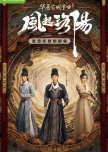
Wild goose chase.
Ancient conspiracy thrillers are right up my alley so I looked forward to Luoyang with bated breath. This is set in Shendu (now Luoyang), capital of Wu Zetian's Wu Zhou Dynasty (690-705). As the only female emperor in over 5000 years of Chinese history, Wu Zetian remains a controversial figure - an ambitious, usurper whose exceptional intelligence and leadership is only matched by her ruthlessness against anyone in her way, including or especially her own children. She cultivated informers and multiple secret police and spy rings that gathered evidence against her detractors. and maintained a careful balance of power between the important political structures of her administration. This is reflected in the drama in the clear delineation of responsibilities between the Judiciary, Inner Guard and Secret Police (Lianfang). During this time, the Wu clan and Li clan were embroiled in a power struggle which persisted until Wu Zetian intervened and clarified her succession plans. Nonetheless it ended in messy plotting, betrayals and twists that are drama worthy in and of themselves. This is rich fodder for conspiracy plots such as this one.The drama starts thrillingly with a bold daylight assassination of an informer and his daughter and the ensuing dizzying high speed chase through the streets of Shendu. All three main protagonists mortician Gao Bingzhu, foodie Baili Hongyi and inner guard Wu Shiyue are at the scene and invisible threads from their past pull them together to uncover a much deeper conspiracy that could rock the very foundations of Wu Zetian's empire. Clues emerge that connect seemingly unrelated cases and force the three protagonists to work together, at first reluctantly and with selfish agendas and then with growing mutual respect and trust that blossoms into deep friendships. I most enjoyed the tripartite friendship in the drama and would have liked to see it better explored rather than unnecessary romantic arcs. Huang Xuan nailed it with his cynical yet paradoxically idealistic Gao Bingzhu; whose shrewdness and insight into dark hearts of man does not extend to those he cares for. I also did not see much chemistry between him and Song Qian who impresses with her fight scenes but falters somewhat in her line delivery. Wang Yibo's performance is strong in some aspects but uneven overall with too many scenes where he is clearly unsure what facial expression to wear. This role does not elevate him for me from an actor that I don't mind watching but wouldn't seek out. That said the trio has enough combined chemistry that I am happy to watch them together again. As for Song Yi, she has gotten enough flack and her character was so poorly written that all I will say is this is a role such a wonderful actress should have just passed on.
I did not enjoy the first two episodes of the drama - too much was happening at the same time and the cameraman swung the camera so wildly I thought he was possessed. The action scenes are exciting and well choreographed enough they did not need to artificially augmented by cheap camera tricks. After the psycho camera settles down, the plot unfolds at an intense and exciting pace against a gorgeous backdrop of dazzling sets and with a deluge of colorfully garbed denizens - they must have hijacked and costumed practically every Hengdian tourist as extras on set I have never seen so many people crammed into each scene. My personal favorite set is the Unwelcome Well which looks almost too inviting to be a ghetto. While the costumes and certain props are anachronistic, everything comes together is such a vibrant and captivating panorama that it scarcely matters. This is complemented by well designed side characters that are based on well known historical figures. Hints of their personalities, scandalous affairs and alliances are quite faithful to history and add a nice ambiance to the setting. It set up for intriguing Dumas like plot twists that didn't materialize.
This drama builds to a top-notch, shocking and heartbreaking climax prematurely at episode 20 where both actors delivered standing ovation worthy performances. It achieves that perfect sequence of shock followed immediately by stunned comprehension and acceptance as all the clues rushed to the fore to blindside the viewer to the next unfolding twist. In the second half, the plot visibly loses momentum and digresses into romantic arcs that don't belong in this genre and filler maudlin flashbacks. The writing of the mini-threads in the second half is insipid with excessive gratuitous character implants, many of whom delivered cringe worthy performances.
In hindsight it would have been difficult to top the fantastic mid-drama climax but it is still extremely disappointing for the final reveal to be so bland. The hollow villain that everyone was on to as a bad guy early on but dismissed as too obvious turns out indeed to be the final villain, one that is not worthy of being called a mastermind. Both their motive and end game plot is not well articulated or convincing. Multiple clues and more interesting suspicious characters that don't play out leave me feeling like I went on a wild goose chase. I don't know if they ran out of money or wasted it on too many bodies but there is no sense of peril or excitement in the final showdown. Forget explosions or collapsing buildings, we don't even get one good last fight scene. The final insult is how unfathomably a feather brain like Liu Feng manages to find himself in the right place at the right time to deliver an unnecessary and uncalled for outcome. This is just a misguided attempt to deliver an audience shocker to make up for the nothing burger of a final reveal.
Even though this remains a very entertaining and highly recommended watch, the ending is a big let down that knocks 0.5 off my final rating for the show. I feel that an 8.0 is the best I can give to this show, which is still one of the better c-dramas of the second half of 2021.
Was this review helpful to you?

The Dark Side of the Moon.
This drama is about how a power couple that is well matched in terms of cunning, ambition and capability scale the upper echelons of banking and finance during 1930s Shanghai. The narrative vividly captures the wild, morally ambiguous, highly speculative, wheeling and dealing nature of the mafia dominated banking and finance industries during that early period of industrialisation.Cheng Yizhi is a scrappy, enterprising, self educated young orphan with a knack for numbers and finance who is raised by a kindly shopkeeper. He starts out in a lowly position at a bank but his talent propels his rapid advancement to become the protege of banking magnate Huang Ruhong. Wu Lizi is the pampered daughter of a distinguished banker whose world falls apart when her father is framed and commits suicide. Hell bent on revenge, she marries Yizhi and ruthlessly uses his access to banking circles to investigate her father's downfall. Mutual lack of communication and a terrible, irreversible decision by Lizi ruins their marriage but leads to a very rewarding business partnership where they build a bank together.
Wu Lizi is one of the most selfish, devious, manipulative, ruthless and utterly charming female protagonists I have come across. It is such a treat to get complex and fascinating female characters like Lizi. That is why I kept watching this even though at one point I was enraged and disappointed to the point of almost dropping. I still don't like how they wrote Lizi to lash out so viciously and vindictively with such heavy consequences but I am glad I kept going because she really moved me with her stoic remorse and acceptance later on. Even though there were some rough edges to Cai Weijing's performance, overall she is tough, willful, curiously vulnerable and so charismatic that I could literally see how she tied Yizhi, Charlie and Xu Du up into knots emotionally.
Zhang Xincheng delivered a most excellent performance in this drama as Cheng Yizhi, a cynical character that well understands the dark side of the moon due to his upbringing on the rough side of town. So he is the ultimate nemesis of dark characters like Huang Ruhong because he can get into their heads and narrowly manages to stay one step head of them. In sharp contrast, he seeks the light in all of his dealings and finances some of the most promising industrialists of the day. At the onset Yizhi goes toe to toe with crooked businessmen and corrupt politicians with equally scheming and wily tactics. But as the story advances and his dark secrets are revealed, the character is whitewashed and becomes too perfect, so understanding with such shiny plated plot armor that I had to roll my eyes. I needed more flaws or to see him be a little bit petty or selfish and to play dirty sometimes. Instead Charlie, a far more interesting and lovable character rises to the occasion to do all the slightly shady things that need to be done in order to stymie their unscrupulous rivals. Nonetheless the lead couple has superb chemistry and the way their relationship blossoms from mistrust and suspicion into an incredible partnership on multiple levels is one of the drama's strengths.
The business subplots are quite interesting, well written and the financial concepts are kept at a simple enough level for laymen. The characters however are less well written and notably Lizi, is not consistently written. For such a smart character she does some retarded things that can only be put down to sloppy writing. Huang Ruhong's somewhat creepy and unfathomable hard on for Yizhe is also unconvincing and not in character for the leader of the criminal underworld. Indeed the true love triangle in this drama is the one between Ruhong, Yizhe and Lizi. This was such a promising antagonist at the start but gets sidelined as the ending arc digresses into yet another patriotic fight the Japanese invaders plot. I would have preferred to see a more satisfying cat and mouse takedown of this smart antagonist play out properly. Towards the later episodes, many key characters are gratuitously killed off to squeeze out the obligatory tears expected of a Republican period drama. This backfires as I only felt very sad for two of the deaths which only highlights that the other characters were two dimensional ones that I never got invested in.
There are many enjoyable and unique aspects to this drama that make it worth watching even though it falls down on messy plot, sloppy character writing and a lame ending arc. Charlie was my favorite character and his wit, style and wisdom saved the show. Overall this is just a 7.5 for me despite strong acting by the leads. And MVP Charlie (Wang Zijian).
Was this review helpful to you?
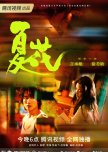
Let life be beautiful like summer flowers...
This tantalizing and poignant love story captures the spirit of carpe diem. It opens with a young girl's chance encounter at the hair salon. She is aroused by a strong and silent stranger from the way he caresses her ears and washes her hair. For most girls, it would stop just there; a titillating fantasy not to be acted upon. But He Ran is not like most girls. She throws herself at Xiao Han shamelessly; not one whit bothered that he is well into his prime. Twist and all, this is a simple and very cliched romance plot that hinges on the chemistry between the leads and whether they can convince audiences to root for them.He Ran's relentless pursuit of Xiao Han can very easily come across as crude and thirsty but Xu Ruohan gets this tricky portrayal mostly right down to the small nuances. She is just an artless young, girl headily experiencing infatuation, desire, and possibly even love for the very first time. She can be incredibly petulant, unreasonable, and childish, like the protected and spoiled little rich girl she is. But she taunts and tempts him with the instinctive provocativeness and burgeoning sensuality of a child-woman. The way she looks at him with her heart in her eyes and the effervescent joy in her smile made me shake my head at the futility of Xiao Han's efforts to evade her charms.
As for Xiao Han, his genuine attempts to resist the ardent allure of this captivating young temptress is just the right touch. He rightly has misgivings - she is too young and they are from different worlds. Xiao Han is a man of few words; a gentle giant who is very still and seemingly unmoved by her attempts to seduce him. Only the smallest microexpressions give him away - the hint of a smile, a tensing of his incredible jawline, a barely perceptible slow sidelong glance, and a whisper of innuendo in his tone. While Xiao Han clearly looks and is more mature, the relationship doesn't come across as exploitative largely because He Ran is the instigator and calls most of the shots. Of course, it helps that Jerry Yan does not look a day over thirty and the only offensive thing about him is how well he wears those sleeveless wife-beater T-shirts.
Their love story unfolds against a lush, almost surreal romantic palette drenched with deep and lush saturated colors of the riotous blooms adorning Xiao Han's intimate seaside home. The couple's sultry chemistry permeates the screen, captured mesmerizingly by the director's avant-garde and sensual visual composition style. The superbly curated soundtrack supercharges the narrative with all the right emotions at every critical juncture. I was invested in their romance the moment I heard the first song, Cantopop hit (半點心 A Drop of Your Heart). At the time, they had barely even met! I am so busy being a Peeping Tom that it takes me a while to notice that the plot doesn't move much. He Ran is just escaping into Xiao Han's world and their relationship is built around "ask me no questions and I will tell you no lies". They are both secretive and repeatedly fail to communicate. Thus despite its addictive beauty, theirs does not bear the hallmarks of a lasting relationship.
He Ran and Xiao Han's relationship shortcomings are amplified by the too coincidental to be true gender reversed second age-gap romance. There the couple actually dares to call each other out and are open about themselves and their doubts and constraints. That said, their initial attraction is too tropey and not convincing and it is a major subplot that develops too late in the main plot line; right after He Ran and Xiao Han's relationship peaks. This long-winded and often boring digression annoyed me and disrupted the momentum of the main romance. Their sizzling chemistry also highlights a more adult passionate intensity that seems missing in He Ran and Xiao Han's encounters.
The Chinese title of this drama 夏花 / Xià Huā or Summer Flowers, comes from Rabindranath Tagore's poem "Let life be beautiful like summer flowers..." After Shakespeare, Tagore is the most widely read and well-loved foreign poet in China. Thus there is already a lot of foreshadowing in the Chinese title. But I think it is not that important how He Ran and Xiao Han's story ends. Because the story's real message is about living in the moment and daring to live and love with no conditions or expectations for the future. That they did and like summer flowers, their love bloomed with wild abandon drenching the earth with the radiant, ecstatic colors of beautiful life. With a little bit of help from Uncle Han, who is just the best fairy godfather ever.
As for the ending, I didn't like it. Not at all. It diminishes both main characters. It is why even though I love many parts of this drama, I can only rate it a 7.5. A better ending would have gotten an 8.0-8.5 from me. I will elaborate on why I am so disappointed in the ending below. It is of course a major spoiler so please don't scroll down if you have not finished watching the drama.
Warning - major ending spoiler way down below.
Major Ending Spoiler
To me killing off a character is a lot better than killing the character of the character. And that is what leaving the door open for some ambiguity does - both He Ran and Xiao Han's characterizations suffer as a consequence. The ending should have been clear and decisive. The drama consistently builds up to it. This loosey-goosey ending makes the timeline messy and creates unnecessary loose ends. Did Xiao Han not accompany He Ran to seek treatment? What about his promise to care for her? Surely he was not growing flowers at home while she was fighting for her life thousands of miles away. But what really takes the cake is He Ran's unreasonable demand that Xiao Han waits for her and loves no one else. It is utterly selfish and insensitive. What if his first love had demanded that of him and he never gave He Ran the time of the day? Dying is easy, it puts her beyond all further suffering and emotion. From then, the suffering begins for the survivors. She sets her mother free but poor Xiao Han is supposed to miss her for the rest of his life? Did she ever even truly love him? Wow! This cop-out ending made me intensely dislike He Ran instead of remembering her poignantly as the brave young girl she was at the beginning. A girl who chose to live life gloriously if briefly instead of wallowing in self-pity.
"Let life be beautiful like summer flowers and death like autumn leaves." - Stray Birds by Rabindranath Tagore
Was this review helpful to you?


 67
67 280
280 8
8 2
2 6
6 2
2 2
2 1
1 1
1 5
5 1
1 1
1 1
1 2
2 2
2 2
2 4
4

















